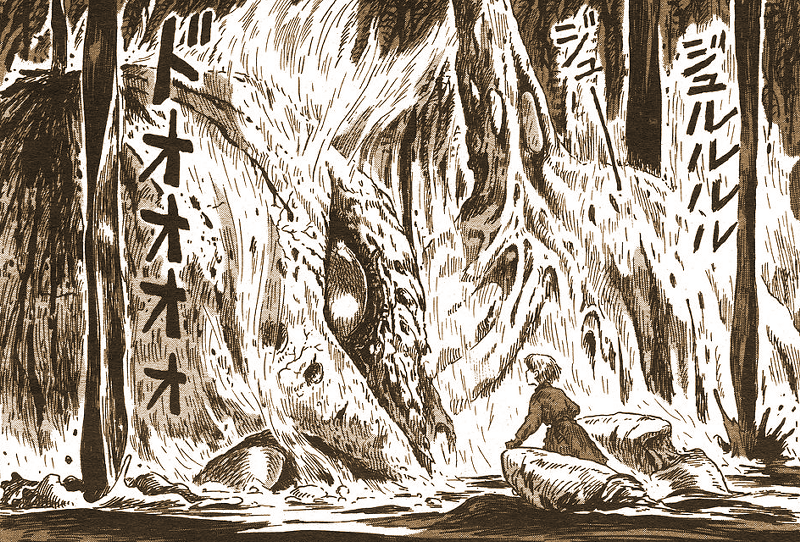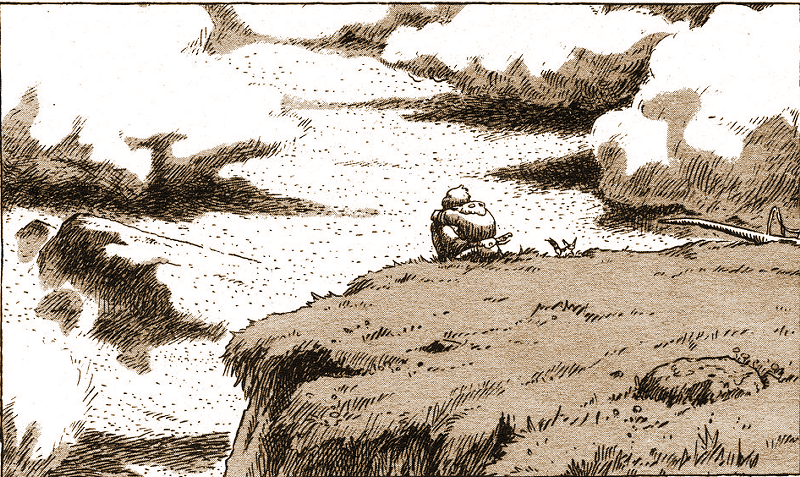
I’ve recently finished reading the manga version in seven volumes of Nausicaa by Hayao Miyazaki. It’s drawn masterfully and one of the greatest stories I’ve read. Miyazaki can be a bit repetitive with his themes and characters (and personal loves, like flight & planes), but one never complains when it’s always up to this level of excellence.
I think the reason why I decided to pick it up is that in April/May I was on Evangelion’s rut and I read that Anno considered the last volume of Nausicaa as Miyazaki’s true masterpiece, and so I was curious not only because of that opinion, but because there’s the theme of how you give a really satisfying closure to these hugely “epic” stories. A climax that is a climax instead of a whimper, as the thing comes crushing down under its own weight.
when Nausicaa was being serialized in Animage Anno used to visit Miyazaki’s office and ask to see the part of Nausicaa currently in progress; Miyazaki wouldn’t let him, so he would go in and look at them when Miyazaki wasn’t there. Anno wished that Miyazaki would stop making anime and focus on the Nausicaa manga. Miyazaki struggled greatly with how to end the manga; now, Anno completely understands how Miyazaki felt. According to Anno, Evangelion ended up being a cross between Devilman and volume seven of the Nausicaa manga. At an “ideological” level, Anno had to arrive at the same answers. Nobi was deeply moved by the Nausicaa movie when she first saw it, but less impressed after reading volume 7 of the manga. The darkness of the manga is eliminated in the film. However, for Nobi, Anno goes in the opposite direction, and is a kind of “black Miyazaki.”
In a way, you could say that Evangelion is an active dialogue with Nausicaa, so Nausicaa also offers an interesting angle to interpret Evangelion. I always do care about these undercurrents that link different works, that’s the real soul of every creative process.
In any case the ending of Nausicaa is actually quite excellent. I found the very last page a little “cheesy” but the important aspect is that the whole last volume is a crescendo that does a number of things right. One is that there actually is that crescendo. I noticed a couple of aspects about it. The first is that there’s a sense of leaving things behind. As characters approach the apex of the story, they lose a lot of what they care about. This gives the ultimate journey a sense of inevitability. And the other aspect is that this sense of inevitability also hooks into a series of progressive revelations that “rewrite” the perception of the world. So the story rises toward its conclusion while it also sheds its mortal spoils. Every step forward manifests the impossibility of ever going back from where you started. This is both story and knowledge. Once you “know”, you can’t pretend you don’t. Life changes, pushes on.
On the other side, though, I think Miyazaki asks all the good questions, but the final answer is the wrong one. Without spoiling so much I’d say the explicit “message” of the manga is about the celebration of life over the controlled manipulations of men. This is essentially at the core of the last volume, with Nausicaa becomes like an “angel of darkness”. Which is obviously a shifting point of view.
Anno: Another [major influence] was the seventh volume of the Nausicaa manga.
Takekuma: That [volume] is incredible. It reversed all the values [that had been in place].
Anno: I felt like it was the same as what I [was doing]. After that I couldn’t help but make [the work into] Nausicaa, to treat the same themes as the seventh volume of Nausicaa.
Oizumi: Nausicaa was unable to live as one of the ancients.
Anno: She rejected coexistence [with them]. She bloodied her hands so that her own people would survive. That was good. This karmic punishment that required [her] to destroy [them] with the abhorred fire of the God Warriors – that was good (laughing). [Good] because the true views of Hayao Miyazaki were expressed, and there, at least, he took off his underwear [and showed himself naked]. In the manga he took off his underwear, and his penis was erect (laughing). I am hoping that he will do the same in Princess Mononoke.
My problem with Miyazaki’s final answer is that the work is presented as the conflict of human beings versus nature. In the end Nausicaa becomes a messenger from Nature itself. She speaks as a goddess (so the messianic undertones). The problem is that once again this brings up the conflict in Cartesian Dualism. Man versus nature. But the point is that human beings rise from that same nature. Scott Bakker put it in a great quote:
the terrifying prospect that they themselves are merely more nature, not nature + x
If we are merely more nature, then we are part of that cycle, not fighting it. Whereas in Miyazaki’s vision men and nature are on two different shores, facing each other. This is the explanatory gap in science and religion. Knowledge and experience. So a vision that is total instead of partial needs making the two into one. If human beings exist it is because Nature is staring at itself. This is an actual quote from Nausicaa (or Nietszche):
if you gaze long enough into an abyss, the abyss will gaze back into you.
But the actual point in Nausicaa is that “life is change” and it can’t be bridled. She literally destroys the gods and refuses their gifts. Even if built with the best intentions and out of idealism, those gods were still a fixed form that, being fixed and unchanging, was contrary to life. She takes down the gods even if accused that hers is a nihilistic perspective that will destroy all life (and it’s not just a threat). I guess one could say that men’s plan can be utterly delusional, but they can’t be considered “contrary” to life. That’s the big picture: either human beings are part of the flow of life and no different from every other life form, abiding to the rules of life, OR whatever “evil” that humans have embedded in them still has to come directly from Nature itself. In Nausicaa instead those are at opposite ends. Men’s plans defy the course of nature, and are to be defied in turn.
From the point of view of ethics it’s hard to see human beings as some kind of alien anti-Natural species. Is it ethical to grasp our power to bend Nature? Either we see human beings as part of the same Natural system, the bigger picture, and so everything in our power still sits within the domain of Nature, it’s Nature giving that power to us and we use it because we are in that system, OR we think “ethically”. Why this distinction? Because either Nature has its own laws and forms, and so, being immersed in it, those laws represent our domain, the dome that we cannot breach even if we wanted to. So we are system, and not anti-system, or extra-system. And so everything we can do is ethical already, because Nature is the law, and whatever we do still comes from Nature and is not distinguished from it. OR, again, “ethics” are not “natural” and are instead man-made. So we personally, subjectively judge. It becomes “choice”, and the responsibility that comes with that choice. We can’t anymore rely on something external that tells us what’s ethical or not, it’s simply our own arbitrary choice.
All this bringing back to the problem of Godel-defying reflexivity. The abyss that stares back at you while you stare at it. The maker is made, the observer is observed. Or: the rules are continuously redefined. The fundamental principles rewritten. A self-changing, adapting thing that is always in flux. But this again risks being just another optical illusions that sees itself as a whole just because it doesn’t perceive all the connections.
So I see all this as a problematic theme in Nausicaa because of the contradiction at the core. But this could also be somewhat addressed within the work itself: Nausicaa is seen as a kind of angel that appears at the right time. She has her mechanical “wings” and she exploits people’s delusions, but even if there’s (almost) nothing magical about her, metaphorically that role fits on her. She becomes just another natural force that appears to oppose what came before, and doing so she celebrates just that spontaneous self-correcting property of life and nature, without breaching the system. She is one life force that restores a balance.
Along all this there’s also the other perspective that is much simpler and more solid: parent/child relationship. In this case the emancipation is really part of life’s process. Parents devise the ideal way for their children to develop, moved by those hopes and idealistic desires about their children and their future. All product of “goodwill” but that can really turn for the worst in spite of it. There’s a moment where the child has to rebel about whatever pattern was imposed on himself, rightly so. You, thankfully, just can’t control this aspect of life.
So, Nausicaa deals with all this and more. It does it excellently for the most part, even if it falls a bit in that Cartesian Dualism explanatory inconsistency. I guess we wait for Scott Bakker to be radical about it.


